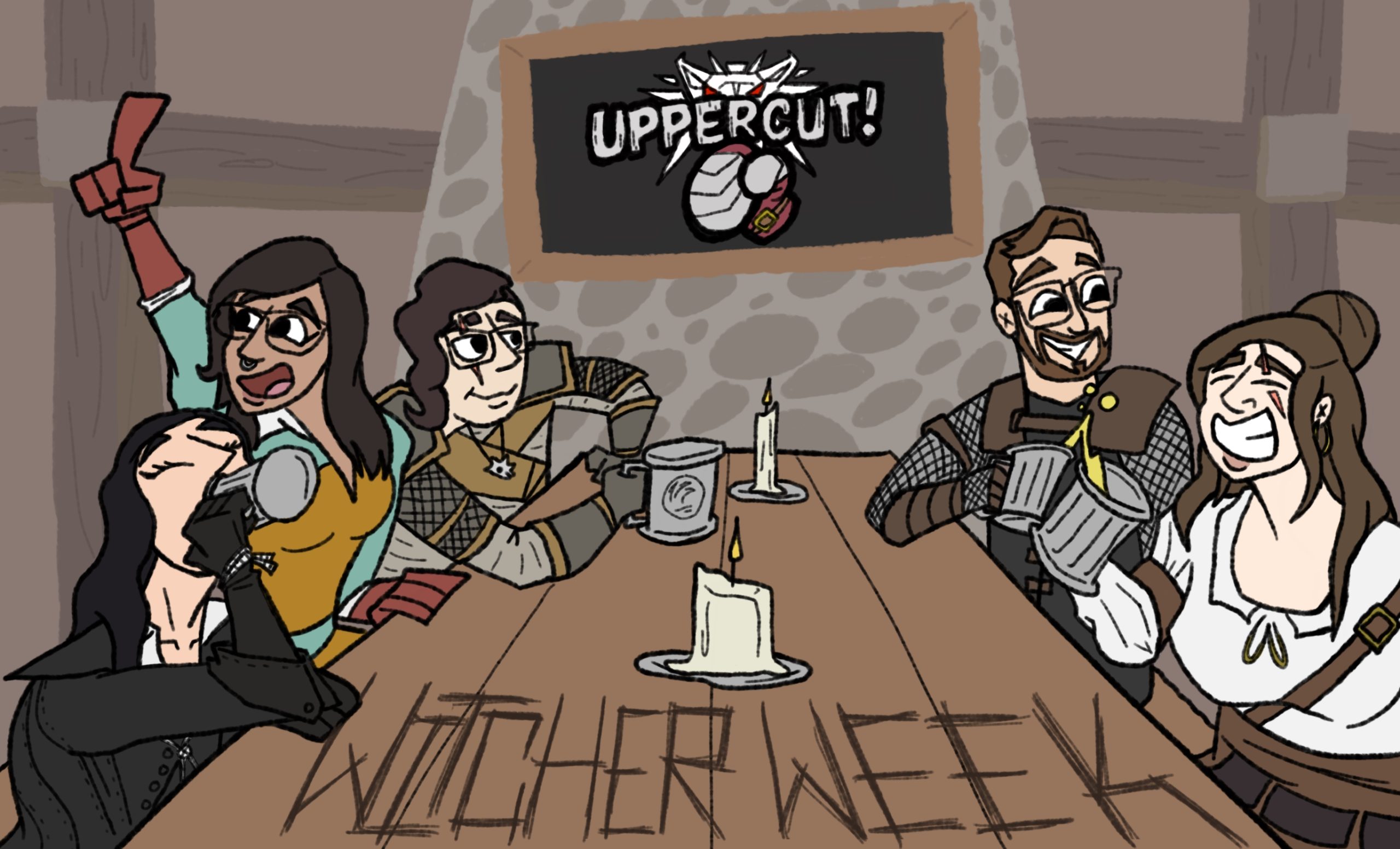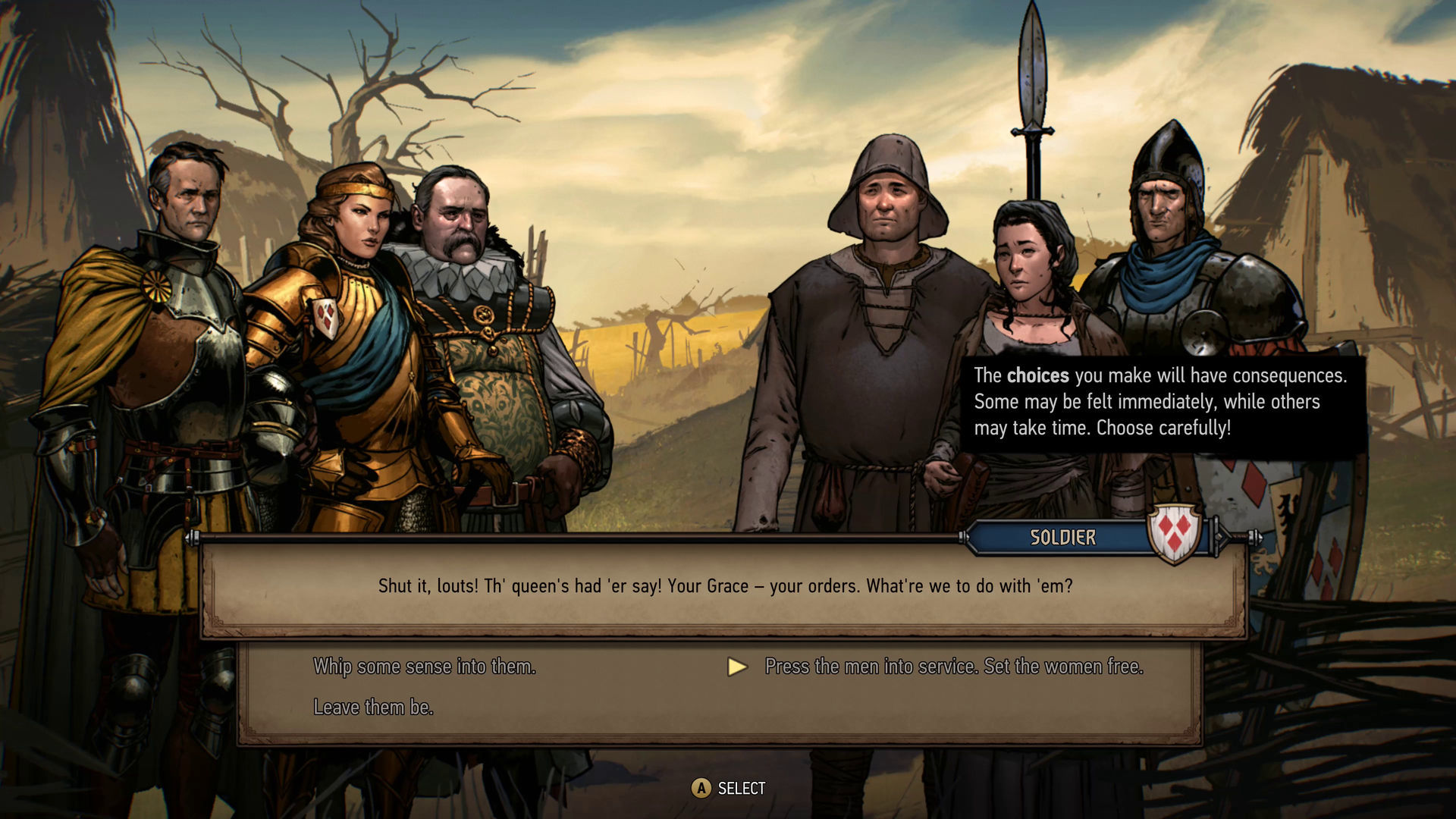
When it Comes to the “Lesser Evil”, Thronebreaker Falters
The grey area when it comes to morality is nothing new for the juggernaut Witcher series. In fact, its portrayals of complicated ethical dilemmas our boy Geralt is forced to contend with are often used as a selling point to buy people in on its narrative chops. Throughout all incarnations of the series, be it the books, the games, or the newly released Netflix adaptation, there’s a heavy focus on the fact that Geralt is routinely faced with choices where there will always negative consequences, regardless of which path he chooses. The world of The Witcher is obsessed with “the lesser evil,” and itsis generally effective at conveying how difficult such choices would be. All except the new Gwent RPG, The Witcher Tales: Thronebreaker.
Don’t get me wrong, this new entry absolutely wants you to think it’s presenting hard choices that may have unexpected consequences, or may leave you “wondering if you made the right one,” as the show puts it, but the lack of depth and self-awareness in these situations is actually astonishing when compared to how the other mediums handle things.
In Thronebreaker, you don’t play as our usual bathtub boy. Instead, you take control of Meve, Queen of Cintra and Rivia, as she’s returning from a diplomatic mission. What starts as a campaign to get rid of a particularly nasty troupe of bandits who have been terrorizing the citizens, turns into an all out war and struggle to maintain power as Nilfgaard’s invasion forces come calling. War is the perfect place for video games to attempt to tell the stories of hard choices, but Thronebreaker fails because it lacks the nuance of its counterparts.
Every time Meve is forced to make a plot-related decision, the game defaults to a “lesser evil” framing, even when one side is clearly not evil in the slightest. Let me paint you a picture: at one point, you encounter a Nilfgaardian battalion on the road. If you decide to engage them and you win, it’s revealed that the cargo they were transporting is not supplies or gold, as you had been hoping, but instead peasants who have been captured and are going to be sold as slaves. The choice presented to you is either to take these poor people with you to ensure that they’re cared for and protected in the midst of a wartorn country, or to abandon them to their fate to save supplies for your already ragged army. While this choice is a bit tricky in terms of gamer brain crunching the numbers and wanting to have optimal resources, it’s blatantly clear that there’s a false equivalence here, as only one choice is actually evil.
Taking a bunch of wounded, malnourished peasants along might not be the most tactically sound decision, but it’s absolutely the right one. To be a leader willing to leave your people to starve, especially when you’re the one insisting that there needs to be a war in the first place, is obviously a bad thing, one that you could only feel justified in committing to if you’re used to the black and white morality systems that games have fed us for so long. But that’s the exact opposite of what The Witcher franchise tends to do so well, and it really undercuts the whole experience.
While other entries do their utmost to realize a world where people are complicated, relationships are fraught, and predjudices of all kinds run rampant, Thronebreaker seems to want to give into our base Gamer notions of what morality and war stories should look like, even in their consequences.
Let me set another scene I encountered: Meve and her retinue come across a town that’s been attacked by the Nilfgaardians, and there’s an angry mob attempting to execute an elf they believe to be a Nilfgaardian spy. This is clearly a case of fantasy racism, as it’s no secret that tensions are high between humans and non-humans on The Continent. Again, this is a no brainer decision. Rescuing the elf is obviously the right call here as someone with any amount of empathy or a moral compass. But the game wants to complicate that the way its brethren do, and totally misses what makes those complications interesting. Shocking no one, the elf ends up betraying you anyway by attempting to poison Meve and her troops, and is summarily executed. Unlike any of the other tricky decision-based quests in The Witcher 3, I could see this coming as soon as I saved him, and it was frustrating to be proven right.
The story of the Scoa’tiel in the world of The Witcher is compelling because it digs into the idea of what differentiates terrorism from freedom fighting. There’s a lot to unpack within that, along with the racial implications at play, but if nothing else, these themes are at least given their due weight and complexity. Thronebreaker eliminates this nuance; the elf betrayed you even though you were kind because his hatred for humans couldn’t be overcome, so he had to die.
Unlike Geralt, Meve is not moving through the world as a biological outsider who’s supposed to remain neutral. She’s been at the peak of privilege and prestige for most of her life, and is now fighting to regain what she perceives to be hers. The Witcher properties that follow Geralt show that everything is inherently political and that you cannot truly stay neutral in any situation, which is what makes them worth consuming in a world where people want to de-politicize art any chance they get. But Thronebreaker shirks this, instead relying on the standards of these stories. Meve has a defined political position, and it’s considered to be the correct one. Anyone who gets in the way of that can’t be depicted positively. You don’t even get to choose to be sympathetic to the elf’s viewpoint, to offer him mercy once again. He is written off for his convictions because they inconvenience Meve and her mission.
Given the history of how The Witcher (particularly The Witcher 3) portrayed characters with complex viewpoints and histories, this sucks. Think of the Bloody Baron, who while, yes, is an absolute piece of shit, is at least a complicated one. Through the journey of his quest and the revelations in Crookbag Bog, we are given an insight into how such an appalling situation could manifest due to the awful combination of nasty feudal systems, addiction, and toxic notions of masculinity and marriage. Even though it feels gross, Wild Hunt provides an insight that truly shows both sides, while still ultimately condemning one of them, despite things being pretty gnarly all around. Thronebreaker is not given that wiggle room however, leaving all of its choices feeling hamfisted, obvious, and undeserving of the “lesser of two evils” framing.
Reducing a Witcher title to such black and whites does its world a disservice, and seems to demonstrate a lack of confidence in their worldbuilding abilities beyond a 100+hour RPG. I’m sure there are plenty of new challenges that come with narrating a deckbuilder’s main story over the standard RPG adventure, but leaving so much behind in favor of a privileged character with none of the usual political and personal complexity makes for a lackluster Witcher story that may as well have gone with a Paragon/Renegade system for all the nuance it provides. Meve is not a figure trying to find the right path through a complicated and divided world, she’s a noble with an unbending sense of how things should be that could rival Ned Stark. It is only a character like this who could see doing what’s obviously right as the lesser of two evils.







